September 15, 2007
Annemarie Lucas - Animal Precinct
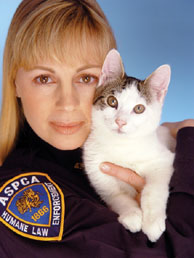 We
speak with Annemarie Lucas, who is a Supervisory Special Investigator
for Humane Law Enforcement (HLE) at the American Society for the
Prevention of Cruelty to Animals (ASPCA). She has received training
by both the New York City Police Department (NYPD) and the Federal
Bureau of Investigation (FBI). Annemarie is also the star of Animal
Precinct. She currently discusses how someone who is interested
in this line of work can get started,
We
speak with Annemarie Lucas, who is a Supervisory Special Investigator
for Humane Law Enforcement (HLE) at the American Society for the
Prevention of Cruelty to Animals (ASPCA). She has received training
by both the New York City Police Department (NYPD) and the Federal
Bureau of Investigation (FBI). Annemarie is also the star of Animal
Precinct. She currently discusses how someone who is interested
in this line of work can get started,
Humane Law Enforcement/Animal
Control Officer:
HLE/AC officers inspect kennels, pet shops,
stables, and other places where animals are kept to make sure
that animal welfare regulations are being followed. HLE/AC officers
respond to reports of animal cruelty, investigate, and if warranted,
may make arrests. HLE/AC officers also enforce licensing laws
and rescue trapped animals. For example, there was a fire in a
building in Manhattan and ASPCA HLE officers went into the building
with the help of the fire department and rescued the animals that
were trapped in the building.
- To become a HLE/AC officer usually requires
a minimum of a high school diploma, possibly some courses in
criminology and animal sciences and specific job training. Prior
experience as a police officer, park ranger or peace officer
will make you a more attractive candidate for the job.
- Some states require certification.
- The OOH predicts fast as average (9-17%)
growth for jobs in Animal Control through 2014.
http://www.ASPCA.org
Starting a Pet-Sitting Business
Jaime Deason, Fetch! Pet-Sitting
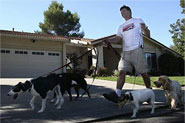 Jaime Deason had trouble finding
good pet care for her own pets. She also thought that others might
have the same problem. As a result, she decided to open up her
own pet-sitting business and contacted Fetch! Pet Care.
Jaime Deason had trouble finding
good pet care for her own pets. She also thought that others might
have the same problem. As a result, she decided to open up her
own pet-sitting business and contacted Fetch! Pet Care.
Fetch! Pet Care was able to help her to
setup her business and trained her how to recruit, train, motivate
and manage her staff.
But, pet-sitting isn't for everyone. Here
are six things to be aware of:
1. You're going to get dirty.
Be ready for a lot of exercise in all kinds of weather. In the
summer "I definitely take two showers a day," Jaime
Deason says.
2. You'll need transportation.
Make sure you enjoy spending time in your car. Pet sitter Gabe
Schneider estimates that he spends 20 percent of his time driving
from one assignment to another.
3. You won't have steady hours.
Working from home means you never get to leave your job at the
office. Deason says, "My husband has implemented a no-phone-at-the-dinner-table
rule." But otherwise she encourages her sitters to call her
with problems at any time of the day or night.
And because business naturally fluctuates,
Deason can't guarantee her sitters, who are independent contractors,
a set number of hours.
4. Your vacation time will be unusual.
Demand for your services is highest on weekends, summers and holidays.
5. You'll need to be flexible.
Deason recently gave up a weekend trip to take a boarding assignment
when it was discovered at the last minute that an apartment-living
dog who was assigned to another sitter couldn't handle the stairs
in her house.
6. You'll need to be an animal and people
person.
Perhaps the most important thing to remember is that pet-sitting
is a people business as much as an animal one. And as Deason says,
"With pets, like children, everyone has their own idea of
how to raise them." Some people are laid back, some people
are finicky. "You're going to run into all kinds of idiosyncrasies,"
Deason says. "Some people like their dog food mixed by hand.
You'll never cease to be surprised."
Who would have thought that caring for
pets could be lucrative? The fact is, over 69% of U.S. households
own one or more pets and the demand for specialized pet care services
outfaces the supply of professionally trained operators. In 2007,
Americans are projected to spend over $41 billion on their pets
- double of just a decade ago. By 2009 this number is projected
to grow to over $52 billion. This demand is projected to increase
exponentially every year as pet owners find themselves working
longer hours, traveling more for business and personal reasons,
looking for alternatives to crowded kennels, and generally spending
more on the positive welfare of their furry family members.
To find out more how to get started contact
1-866-FETCH-ME (1-866-338-2463) or email franchise@fetchpetcare.com.
http://www.fetchpetcare.com
Cat Predicts Death
Britt Savage
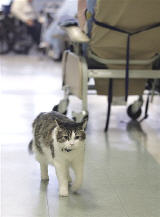 Oscar the cat, who was adopted
as a kitten by the Steere House Nursing and Rehabilitation Center,
seems to be able to predict when patients are close to death.
Oscar the cat, who was adopted
as a kitten by the Steere House Nursing and Rehabilitation Center,
seems to be able to predict when patients are close to death.
When a patient is near death, Oscar curls
up to them during their final time. He has been accurate in over
25 cases. Now, when the staff see Oscar with a patient, they call
family members to come to their loved one's bedside.
The patients that get a visit from Oscar
are very ill and probably are not aware of his presence. However,
family members are comforted knowing that their family member
was not alone.
Oscar recently received a wall plaque
publicly commending his "Compassionate Hospice Care."
So You Want to Become a Dog Trainer?
Joel Norton, HollywoodPaws

Have you ever wondered how to become a
dog trainer? HollywoodPaws is looking for you! Our courses can
teach you everything you need to know to start on the path to
becoming a professional dog trainer. Learn the tricks of the trade
from the commands for basic obedience to the complex cues
used in movies, TV and commercials.
HollywoodPaws holds its trainers to a
higher standard. Our graduates are equipped not merely to give
effective commands but to get a perfect performance out of an
animal actor under the most demanding circumstances.
But what you'll learn in our workshops
and courses has uses far beyond the entertainment world. These
are the bedrock skills for any animal-related career, such as
running a boarding kennel, pet health, pet sitting services or
other pet care business. Possessing these abilities might enable
you to launch your own animal-related enterprise or make additional
income by training part-time. Working with animals is richly rewarding
the kind of career that makes you look forward to Monday
morning but unless you acquire and develop the ability to
communicate effectively with animals, it will remain forever beyond
your reach.
At a young age Joel knew he wanted to
work with animals. Like most children he wanted to be a veterinarian
but discovered there was more out there than just healing the
sick. After seeing a few episodes of "The Crocodile Hunter"
he wanted to be just like Steve Erwin and learn hands on as much
as he could about animals.
To find out more about their workshops,
please call 888-781-7827 or visit http://www.hollywoodpaws.com.
NEWS UPDATE: A Puppy with a Big Heart
 The latest heartthrob in Japan
is Heart-Kun, a little Chihuahua puppy, who was born with a heart-shaped
mark on his coat.
The latest heartthrob in Japan
is Heart-Kun, a little Chihuahua puppy, who was born with a heart-shaped
mark on his coat.
Heart-Kun's guardian, Emiko Sakurada,
states that ever since he was born, she has been having good luck.
Emiko has won the lottery and a concert ticket.
Heart-Kun has become a celebrity after
a local television station aired his story. And as you can imagine,
Emiko has had calls from people who want to buy heart-Kun, but
she is not selling.
 NEWS UPDATE
Brought To You By Simple Solution Natural Line Of Products
NEWS UPDATE
Brought To You By Simple Solution Natural Line Of Products
Hi-Tech Lost & Found -Microchip
ID For Pets Not Yet The Answer
Dr. Jim Humphries, Veterinary
News Network
 Without a doubt, microchips provide
the most reliable and most secure method of identifying your pet.
But, with the never-ending controversy over different types
of microchips, can you really rely on this "high-tech"
ID tag?
Without a doubt, microchips provide
the most reliable and most secure method of identifying your pet.
But, with the never-ending controversy over different types
of microchips, can you really rely on this "high-tech"
ID tag?
Many pet owners assume that the use of
a microchip in their pets will keep their pets safe and bring
them home if they are lost. But, what really happens when your
pets run away? Are pet owners aware that this safe, secure,
and "fool-proof" pet ID can fail?
Essentially, microchips are computer chips
about the size of a grain of rice. Easily implanted under your
pet's skin by a hypodermic needle, microchips provide permanent
identification that won't wear out, fade, or get lost if the pet
runs away. Special scanners find the microchip and can translate
into a specific ID code. These unique numbers can then be found
on a database and, with luck, the owners can be contacted and
the family will be together again.
In the United States currently, there
are microchips using 4 different frequencies. Over the last
17 years, the predominant frequency has been 125 kHz. Some pets
might have a different chip, one that emits a frequency of 134.2
kHz, otherwise known as an ISO chip. If a local shelter does
not have the right scanner, they can actually miss this chip!
This confusion of frequencies has caused
a storm of controversy. According to Dr. Dan Knox of the AVID
Company, these multiple frequencies will continue to put pets
at risk by confusing the system. He says that adding new frequencies
will only cause more work for under-staffed shelters and will
potentially be dangerous to pets.
Dr. Knox's concern was validated in 2004
when a young dog was euthanized after a Virginia shelter failed
to find a microchip. The dog had been implanted with the ISO
chip and the shelter could not read it.
With the exception of the United States,
the rest of the world has been using the ISO chip for identification.
Recently, 2 major veterinary pharmaceutical companies have teamed
up with microchip manufacturers to create a stronger support system
for the ISO chip. They are handing out more than 60,000 new scanners
that are capable of reading all four frequencies in use. Julie
Lux of HomeAgain Pet Recovery says that "our first focus
is to protect the pet."
 But
the mixed up frequencies are not the only real problem with this
high tech system. This second major issue is that many pets are
not properly registered. In fact, Michael Gendreau, product manager
for the ResQ® ISO chip states that less than half of microchipped
pets have been entered accurately into any database a major
fault with this system. Even if they are registered, information
can quickly become outdated if the owner fails to change it during
a move.
But
the mixed up frequencies are not the only real problem with this
high tech system. This second major issue is that many pets are
not properly registered. In fact, Michael Gendreau, product manager
for the ResQ® ISO chip states that less than half of microchipped
pets have been entered accurately into any database a major
fault with this system. Even if they are registered, information
can quickly become outdated if the owner fails to change it during
a move.
All of the microchip manufacturers agree
that veterinarians and shelters must be strongly proactive in
finding ways of getting the information into an easily accessible
national database. Unfortunately, it appears that many of the
registration websites are complicated, often offering multiple
services. According to Ralph Johnson, Executive Director of the
Colorado Veterinary Medical Association, "Pet recovery databases
should be used solely for the purpose of bringing pets home and
not for medical records access or marketing purposes."
These problems are obviously overwhelming
and veterinarians are concerned. This wonderful technology is
simply not ready for prime time. Old fashioned methods, such as
ID collars and tags should be used along with the microchip until
issues can be resolved hopefully sooner rather than later.
http://www.VetNewsNet.com
Fido Friendly Travel Talk
Susan Sims, Fido Friendly Magazine
 Fess Parker's DoubleTree Resort
in beautiful Santa Barbara, California is pet-friendly! Listen
to Fido Friendly Travel Talk with host Susan Sims and Marketing
Manager Beth Olson and find out what's in store for you and Fido
at this 52-acre resort!
Fess Parker's DoubleTree Resort
in beautiful Santa Barbara, California is pet-friendly! Listen
to Fido Friendly Travel Talk with host Susan Sims and Marketing
Manager Beth Olson and find out what's in store for you and Fido
at this 52-acre resort!
We have designated rooms for pets! To
best accommodate you please make your travel arrangements directly
with our Reservations Desk so that we can best serve you.
Pets at the Resort:
- 24 acres of grounds/paths
- Directly across from the beach
- Pet Menu In room dining
- All rooms have balconies or patios
- No size restriction
- A $40.00 one-time, non-refundable pet
fee
- Pet gift upon check in - gifts also
for sale in gift shop
Fess Parker's DoubleTree Resort
633 East Cabrillo Boulevard
Santa Barbara, CA 93103
(805)-564-4333
http://www.fpdtr.com
Fido Friendly Magazine:
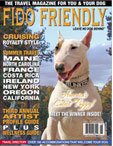 The
Travel Magazine For You & Your Dog, a complete guide to Fido-friendly
accommodations across the United States and Canada. "Fido
Friendly is the only magazine dedicated to the travel lifestyle
of man's best friend, and the one magazine your dog will thank
you for." And don't forget to join the Fido Friendly Travel
Club.
The
Travel Magazine For You & Your Dog, a complete guide to Fido-friendly
accommodations across the United States and Canada. "Fido
Friendly is the only magazine dedicated to the travel lifestyle
of man's best friend, and the one magazine your dog will thank
you for." And don't forget to join the Fido Friendly Travel
Club.
http://www.fidofriendly.com
http://www.fidofriendlytravelclub.com
World's Smallest Horse
Michael Goessling, Thumbelina
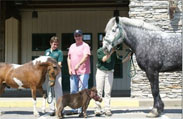 She stands a mere 17.5" tall
and weighs 57 pounds. Her brown-and-white coat feels like velvet
and her enormous brown eyes suggest a quiet wisdom. They also
belie a mischievous Side. She likes to untie shoe laces when you're
not looking and wiggle under fences to reach grassy fields. When
she's not playing with her best friend, Cassie, an Estrella Mountain
Dog (I hadn't heard of this breed either; they're very rare),
she can be found napping in an Igloo doghouse.
She stands a mere 17.5" tall
and weighs 57 pounds. Her brown-and-white coat feels like velvet
and her enormous brown eyes suggest a quiet wisdom. They also
belie a mischievous Side. She likes to untie shoe laces when you're
not looking and wiggle under fences to reach grassy fields. When
she's not playing with her best friend, Cassie, an Estrella Mountain
Dog (I hadn't heard of this breed either; they're very rare),
she can be found napping in an Igloo doghouse.
Her name is Thumbelina and she is the
world's smallest horse.
Born six years ago at Goose Creek Farms
in Missouri, Thumbelina has been turning heads from the moment
of her birth, according to her handler Michael Goessling. "It
was early morning of May 1, 2001 and my mom said there was something
in the barn that I had to see," Goessling remembers.
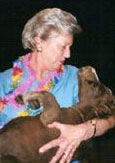 "At
first I thought it was a possum but as I got closer, I realized
it was a tiny foal."
"At
first I thought it was a possum but as I got closer, I realized
it was a tiny foal."
Thumbelina was born to two miniature horses
and she is extra tiny because she is also a dwarf, making her
a "mini-mini." While she is perfectly healthy in most
respects, she does have a few orthopedic issues. If you look closely,
you can see that her right rear leg turns slightly inward and
she wears special shoes to help compensate for the deformity.
And because of her petite physique, she can't carry a rider on
her back.
"She's never been ridden and never
will," stresses Goessling. "She has other things to
do!"
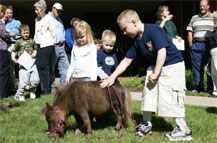 Goessling
is referring to the Thumbelina Children's Tour, whose goal is
to raise $1 million this year to help sick and needy children.
Since May, Thumbelina and Goessling have been, um, hoofin' it
around the country in a specially-equipped 30-foot RV dubbed the
"Thumby Mobile." This dynamic duo are making stops in
the 48 contiguous states and delivering smiles and hope at children's
hospitals, schools, summer camps, fairs, horse shows and charitable
fundraisers. They will wrap up the tour in November at the Macy's
Day Parade in New York City.
Goessling
is referring to the Thumbelina Children's Tour, whose goal is
to raise $1 million this year to help sick and needy children.
Since May, Thumbelina and Goessling have been, um, hoofin' it
around the country in a specially-equipped 30-foot RV dubbed the
"Thumby Mobile." This dynamic duo are making stops in
the 48 contiguous states and delivering smiles and hope at children's
hospitals, schools, summer camps, fairs, horse shows and charitable
fundraisers. They will wrap up the tour in November at the Macy's
Day Parade in New York City.
Thumbelina is the perfect children's advocate.
After all, her name comes from the Hans Christian Andersen fairytale
of a woman the size of a thumb.
Thumbelina is also looking for corporate
sponsors for the remainder of her tour.
http://www.worldssmallesthorse.com
Goats as Pets?
Councilman Richard Conlin,
Seattle, WA
 Goats as pets? Why not! Seattle
City Councilman, Richard Conlin, feels that people in Seattle
should have the right to have a miniature goat as a pet.
Goats as pets? Why not! Seattle
City Councilman, Richard Conlin, feels that people in Seattle
should have the right to have a miniature goat as a pet.
Cat and dogs are legal, so why not goats?
In fact, there are many qualities of pygmy goats. They can "mow
a lawn," clean out the weeds and provide milk and cheese.
What cat or dog can do that?
Currently, goats are classified as a farm
animal and cannot be confined on lots smaller than 20,000 square
feet. Conlin would like to see them changed to a classification
of a small animal, with licensing just like dogs and cats.
Conlin also said that the disease risk
is low, but that unneutered male goats have a certain smell. Having
the goat neutered would solve that problem. They would also have
to be de-horned for obvious reasons.
http://www.seattle.gov/council/conlin
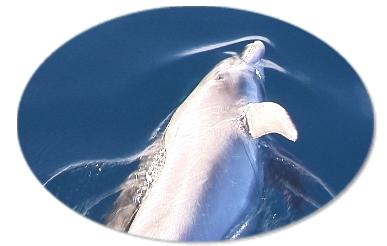 Frolicking
Whales and Dolphins
Frolicking
Whales and Dolphins
Jan Sluizer
Jan reports on a catamaran ride of the south Maui coast to watch
whales and dolphins frolic.
Listen
to the entire Podcast of this show (#407).
 View Animal Radio
Network™ Broadcast Schedule in a new window.
View Animal Radio
Network™ Broadcast Schedule in a new window.
 Listen to Animal Radio®
- Go to the launch page
Listen to Animal Radio®
- Go to the launch page
 Return to Animal Radio Network™ Home Page
Return to Animal Radio Network™ Home Page
 Read
September Newsletter
Read
September Newsletter
Copyright 2007 All Rights
Reserved Animal Radio Network LLC
 We
speak with Annemarie Lucas, who is a Supervisory Special Investigator
for Humane Law Enforcement (HLE) at the American Society for the
Prevention of Cruelty to Animals (ASPCA). She has received training
by both the New York City Police Department (NYPD) and the Federal
Bureau of Investigation (FBI). Annemarie is also the star of Animal
Precinct. She currently discusses how someone who is interested
in this line of work can get started,
We
speak with Annemarie Lucas, who is a Supervisory Special Investigator
for Humane Law Enforcement (HLE) at the American Society for the
Prevention of Cruelty to Animals (ASPCA). She has received training
by both the New York City Police Department (NYPD) and the Federal
Bureau of Investigation (FBI). Annemarie is also the star of Animal
Precinct. She currently discusses how someone who is interested
in this line of work can get started, Jaime Deason had trouble finding
good pet care for her own pets. She also thought that others might
have the same problem. As a result, she decided to open up her
own pet-sitting business and contacted Fetch! Pet Care.
Jaime Deason had trouble finding
good pet care for her own pets. She also thought that others might
have the same problem. As a result, she decided to open up her
own pet-sitting business and contacted Fetch! Pet Care. Oscar the cat, who was adopted
as a kitten by the Steere House Nursing and Rehabilitation Center,
seems to be able to predict when patients are close to death.
Oscar the cat, who was adopted
as a kitten by the Steere House Nursing and Rehabilitation Center,
seems to be able to predict when patients are close to death.
 The latest heartthrob in Japan
is Heart-Kun, a little Chihuahua puppy, who was born with a heart-shaped
mark on his coat.
The latest heartthrob in Japan
is Heart-Kun, a little Chihuahua puppy, who was born with a heart-shaped
mark on his coat. NEWS UPDATE
Brought To You By
NEWS UPDATE
Brought To You By  Without a doubt, microchips provide
the most reliable and most secure method of identifying your pet.
But, with the never-ending controversy over different types
of microchips, can you really rely on this "high-tech"
ID tag?
Without a doubt, microchips provide
the most reliable and most secure method of identifying your pet.
But, with the never-ending controversy over different types
of microchips, can you really rely on this "high-tech"
ID tag? But
the mixed up frequencies are not the only real problem with this
high tech system. This second major issue is that many pets are
not properly registered. In fact, Michael Gendreau, product manager
for the ResQ® ISO chip states that less than half of microchipped
pets have been entered accurately into any database a major
fault with this system. Even if they are registered, information
can quickly become outdated if the owner fails to change it during
a move.
But
the mixed up frequencies are not the only real problem with this
high tech system. This second major issue is that many pets are
not properly registered. In fact, Michael Gendreau, product manager
for the ResQ® ISO chip states that less than half of microchipped
pets have been entered accurately into any database a major
fault with this system. Even if they are registered, information
can quickly become outdated if the owner fails to change it during
a move. Fess Parker's DoubleTree Resort
in beautiful Santa Barbara, California is pet-friendly! Listen
to Fido Friendly Travel Talk with host Susan Sims and Marketing
Manager Beth Olson and find out what's in store for you and Fido
at this 52-acre resort!
Fess Parker's DoubleTree Resort
in beautiful Santa Barbara, California is pet-friendly! Listen
to Fido Friendly Travel Talk with host Susan Sims and Marketing
Manager Beth Olson and find out what's in store for you and Fido
at this 52-acre resort! The
Travel Magazine For You & Your Dog, a complete guide to Fido-friendly
accommodations across the United States and Canada. "Fido
Friendly is the only magazine dedicated to the travel lifestyle
of man's best friend, and the one magazine your dog will thank
you for." And don't forget to join the Fido Friendly Travel
Club.
The
Travel Magazine For You & Your Dog, a complete guide to Fido-friendly
accommodations across the United States and Canada. "Fido
Friendly is the only magazine dedicated to the travel lifestyle
of man's best friend, and the one magazine your dog will thank
you for." And don't forget to join the Fido Friendly Travel
Club. She stands a mere 17.5" tall
and weighs 57 pounds. Her brown-and-white coat feels like velvet
and her enormous brown eyes suggest a quiet wisdom. They also
belie a mischievous Side. She likes to untie shoe laces when you're
not looking and wiggle under fences to reach grassy fields. When
she's not playing with her best friend, Cassie, an Estrella Mountain
Dog (I hadn't heard of this breed either; they're very rare),
she can be found napping in an Igloo doghouse.
She stands a mere 17.5" tall
and weighs 57 pounds. Her brown-and-white coat feels like velvet
and her enormous brown eyes suggest a quiet wisdom. They also
belie a mischievous Side. She likes to untie shoe laces when you're
not looking and wiggle under fences to reach grassy fields. When
she's not playing with her best friend, Cassie, an Estrella Mountain
Dog (I hadn't heard of this breed either; they're very rare),
she can be found napping in an Igloo doghouse. "At
first I thought it was a possum but as I got closer, I realized
it was a tiny foal."
"At
first I thought it was a possum but as I got closer, I realized
it was a tiny foal." Goessling
is referring to the Thumbelina Children's Tour, whose goal is
to raise $1 million this year to help sick and needy children.
Since May, Thumbelina and Goessling have been, um, hoofin' it
around the country in a specially-equipped 30-foot RV dubbed the
"Thumby Mobile." This dynamic duo are making stops in
the 48 contiguous states and delivering smiles and hope at children's
hospitals, schools, summer camps, fairs, horse shows and charitable
fundraisers. They will wrap up the tour in November at the Macy's
Day Parade in New York City.
Goessling
is referring to the Thumbelina Children's Tour, whose goal is
to raise $1 million this year to help sick and needy children.
Since May, Thumbelina and Goessling have been, um, hoofin' it
around the country in a specially-equipped 30-foot RV dubbed the
"Thumby Mobile." This dynamic duo are making stops in
the 48 contiguous states and delivering smiles and hope at children's
hospitals, schools, summer camps, fairs, horse shows and charitable
fundraisers. They will wrap up the tour in November at the Macy's
Day Parade in New York City. Goats as pets? Why not! Seattle
City Councilman, Richard Conlin, feels that people in Seattle
should have the right to have a miniature goat as a pet.
Goats as pets? Why not! Seattle
City Councilman, Richard Conlin, feels that people in Seattle
should have the right to have a miniature goat as a pet. Frolicking
Whales and Dolphins
Frolicking
Whales and Dolphins